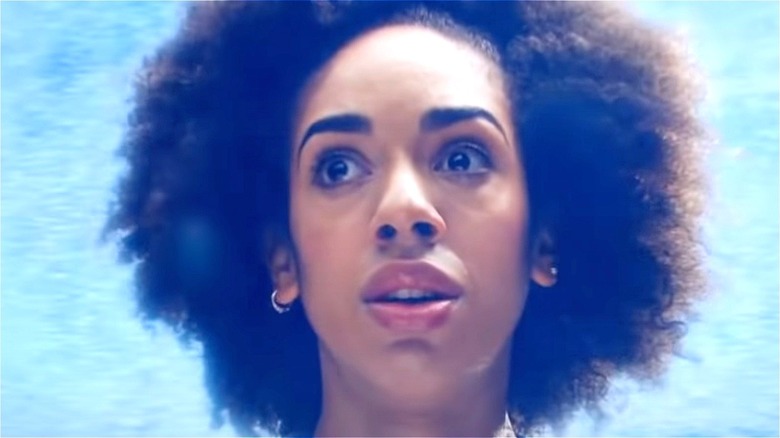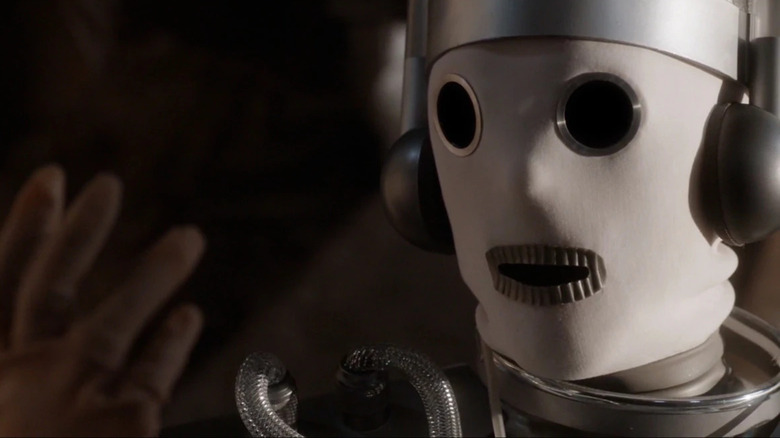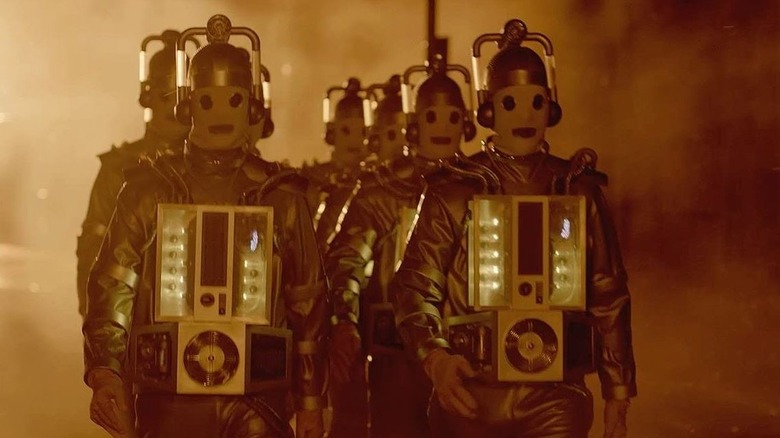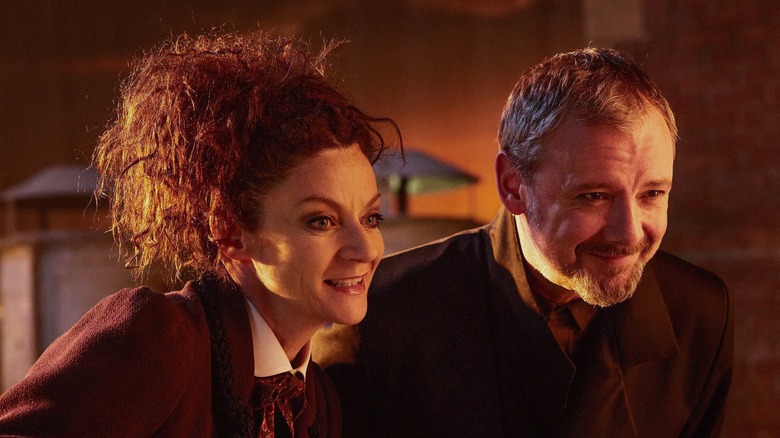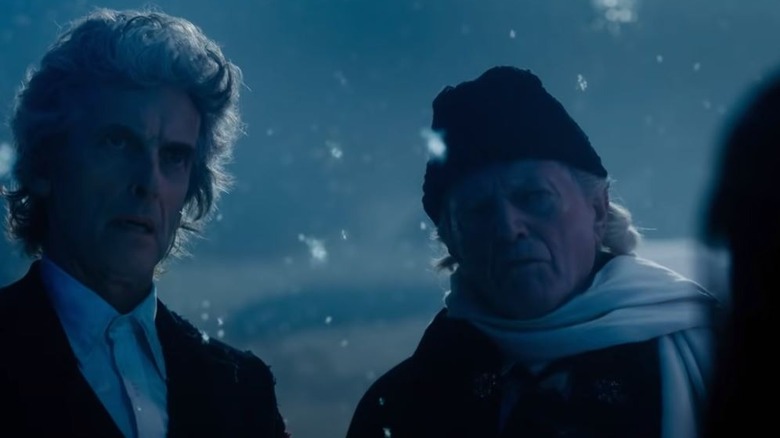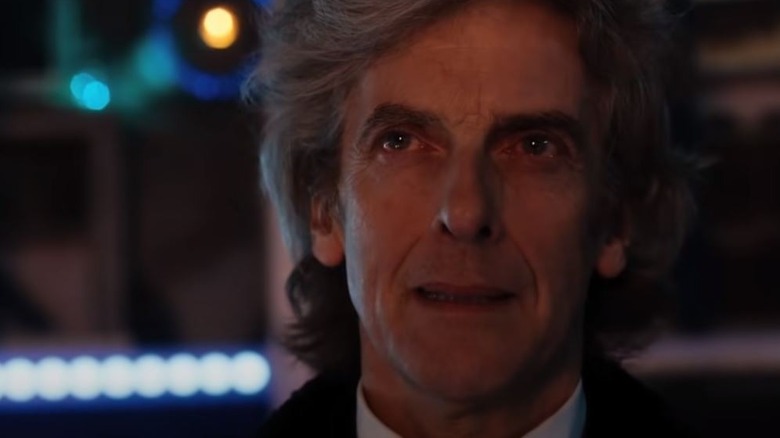The Ending Of Doctor Who Season 10 Explained
The Twelfth Doctor (Peter Capaldi) enters "Doctor Who" Season 10 in a far more relaxed mode than at virtually any other point during his tenure. After losing Clara (Jenna Coleman) and running the twin gamut of the "Heaven Sent" and "Hell Bent" episodes of Season 9, he has reinvented himself as an eccentric professor figure with such an impressively puffy hairdo that even his predecessor (Matt Smith) would be impressed. This is how he enters his final run with two new companions, plucky university student Bill Potts (Pearl Mackie) and old semi-acquaintance Nardole (Matt Lucas).
Of course, when you're as long-lived as danger-prone as the Doctor, things never stay stable for long. By the time the season and the following special episode are over, Twelve has encountered some of his absolute worst fears, and regenerated into the Thirteenth Doctor (Jodie Whitaker). Let's take a closer look at the complex, fascinating ending of "Doctor Who" Season 10.
Bill Potts has a rollercoaster ride of an ending
Over the many, many years of "Doctor Who," the Doctor has nigh-invariably been accompanied by at least one companion. These folks, who are generally from Earth, ground the Doctor and act as a sounding board to his ideas, as well as give the audience a handy viewpoint into the alien main character's world. In Season 10, the main companion is Pearl Mackie's Bill Potts, whose palpable excitement, sense of humor, and tendency to call out the Doctor's more outlandish bluffs and antics make her a great partner to the gruff Twelve.
Because of the Doctor's lengthy lifespan and the show's timey-wimey nature, every companion's time in the TARDIS comes to an end before long. Often, they return home, or find happiness in some strange and faraway place. On occasion, however, they suffer more tragic fates. The ending of Season 10 plots a particularly grim ending to Bill, who's shockingly converted into a Cyberman in the penultimate episode.
Fortunately, this awful fate is ultimately a feint, as her love interest, sentient oil alien Heather (Stephanie Hyam), changes Bill into the same, liquid physical state as hers, and the two set out to travel the universe together. This happy ending doubles as a nice callback to the first episode of the season, in which the Doctor suspects that Bill might meet Heather again. It's also doubly earned, considering the sheer physical and mental anguish Bill goes through in the final episodes of the season.
The Cybermen are reestablished as a true terror
The clunky, clanky Cybermen are among the most iconic villains in the "Doctor Who" universe, but the show has an unfortunate tendency to do them dirty by presenting them as a comparatively low-level threat. This is established as early as Season 2 of the revival series, when the Daleks utterly curb-stomp an alternate-universe version of Cybermen in the episode "Doomsday." Later down the line, Matt Smith's tenure as the Doctor introduces multiple Cyberman varieties, including a flamboyant "cyber-controller" split personality of the Doctor known as Mr. Clever, and a pet Cyberman head the Doctor likes to call Handles.
It's great that the show's willing to explore and expand on these creepy cyborg villains, but "Doctor Who" Season 10 takes a different approach by not-so-gently reminding the viewer that their core concept is plenty terrifying on its own. After all, Cybermen forcefully convert living, conscious beings into a cybernetically augmented groupthink existence that requires a specialized emotional inhibitor to stop the individual Cybermen from realizing the living hell they're trapped in.
The terrifying nature of Cybermen is on full display in the end of Season 10, as is the true threat they pose. Along with the Master (John Simm), the eerie, retro Mondasian Cybermen are the biggest threat of the last two episodes proper of the season. As befits this status, they manage to deal as much damage as any "Doctor Who" villain could hope to, as they mortally wound the Doctor and "upgrade" his companion into one of them.
Book ends for the Master and Missy
Michelle Gomez's the Mistress — or Missy for short — is the reigning incarnation of the Doctor's nemesis, the Master, throughout the Twelfth Doctor's time in the TARDIS. As such, it's fitting that the end of Twelve's tenure marks the end of the road for her, as well. Various incarnations of the Master have entered and exited the show for decades, but the ending of "Doctor Who" Season 10 manages to cram in so many neat details for this character that you might be seriously tempted to call it ... masterful.
Throughout her existence, Missy has manipulated the Doctor's life and expressed an uncommonly keen interest in her frenemy's affairs, even by the Master's standards. By the final episodes of Season 10, she's grown so close to Twelve that the two are borderline friendly, despite Missy's history of countless atrocities. As a delightful counterbalance to her ever-so-slightly softening attitude, the season's endgame brings back the previous incarnation of the Master (John Simm), a particularly ruthless figure with a massive body count and a gleefully evil disposition. This time, Simm's Master returns in truly classic form, complete with disguises, complex machinations, and even the classic goatee of the Roger Delgado era. What's more, his plans involve the Cybermen, which is a nice callback to Missy's own Cyberman-themed machinations in her Season 8 debut.
The two incarnations initially get along like a house on fire, but their meeting ultimately cements Missy's turn for the good. Instead of going along with classic Master shenanigans, she opts to side with the Doctor, and even fatally stabs the Master. Unfortunately, he has time to unleash the full might of the laser screwdriver on her, which marks the end of her journey, as well.
The ending and the special ending
The modern run of "Doctor Who" often throws in special episodes to bookend the seasons. Sometimes, these specials are Christmas episodes, or simply cool stories that are largely unconnected to the season's grander workings. Not so with Season 10, which ends with "Twice Upon a Time," a special that's as instrumental to the lore as they come.
Though alien abductions, World War I-era soldiers and Daleks are involved, "Twice Upon a Time" is ultimately all about the meeting between the First Doctor (portrayed here by David Bradley) and the Twelfth Doctor, both of whom are about to regenerate, but try to fight the process for their own respective reasons. It's a comparatively muted and introspective episode that focuses on the two incarnations trying to come to terms with moving forward, and gaining understanding from each other. As such, it's a perfect epilogue to the mayhem and thrills of the "real" season's final story arc that unfolds over "World Enough and Time" and "The Doctor Falls."
"Twice Upon a Time" is also noteworthy because of its stark contrast to the bombastic finale of Matt Smith's Eleventh Doctor, "The Time of the Doctor." After vanquishing pretty much all of his enemies, Eleven gets a prolonged goodbye scene before reincarnating, virtually instantaneously and with little ceremony, into the Twelfth Doctor. Giving Twelve such a relatively muted sendoff is a classy nod to his unceremonious arrival, while still keeping things classy and assured to reflect his character.
The Doctor falls ... but dictates the future
Acerbic and alien as he may be, the Twelfth Doctor is a fantastic speaker even by sky-high "Doctor Who" standards, and Peter Capaldi is the human personification of gravitas. Twelve has a seemingly unending supply of iconic speeches and monologues, so it's only fitting that the last one he delivers is ... to himself.
At the end of "Twice Upon a Time," the Doctor has finally made peace with his impeding regeneration. True to form, however, he holds off the face-changing fireworks in order to deliver a magnificent, three-minute list of life lessons to his successor-self. Apart from delivering some sage advice on the edibility of pears, he imparts plenty of genuine wisdom. "Never be cruel, never be cowardly," he says. "Remember, hate is always foolish, and love is always wise. Always try to be nice, but never fail to be kind." Right before letting go, he distills his message to six words: "Laugh hard. Run fast. Be kind."
Since this is quite literally the Doctor talking to himself, it's clear that the words come straight from the heart(s). However, there just might be something more to it. Twelve is well aware that the reincarnation process can be affected to an extent, and has even done so in the past. After all, he himself instinctively chose the face of a former acquintance, Roman noble Caecilius (also played by Capaldi), to remind himself of his moral duty to save people no matter how grim the situation seems. It just so happens that the advice ends up being a pretty accurate description of its intended recipient, the brave. kind, and friendly Thirteenth Doctor (Jodie Whittaker). In essence, the Twelfth Doctor's final speech is more than just a cool monologue, or even a goodbye: It's a sneak peek into the character's future.
